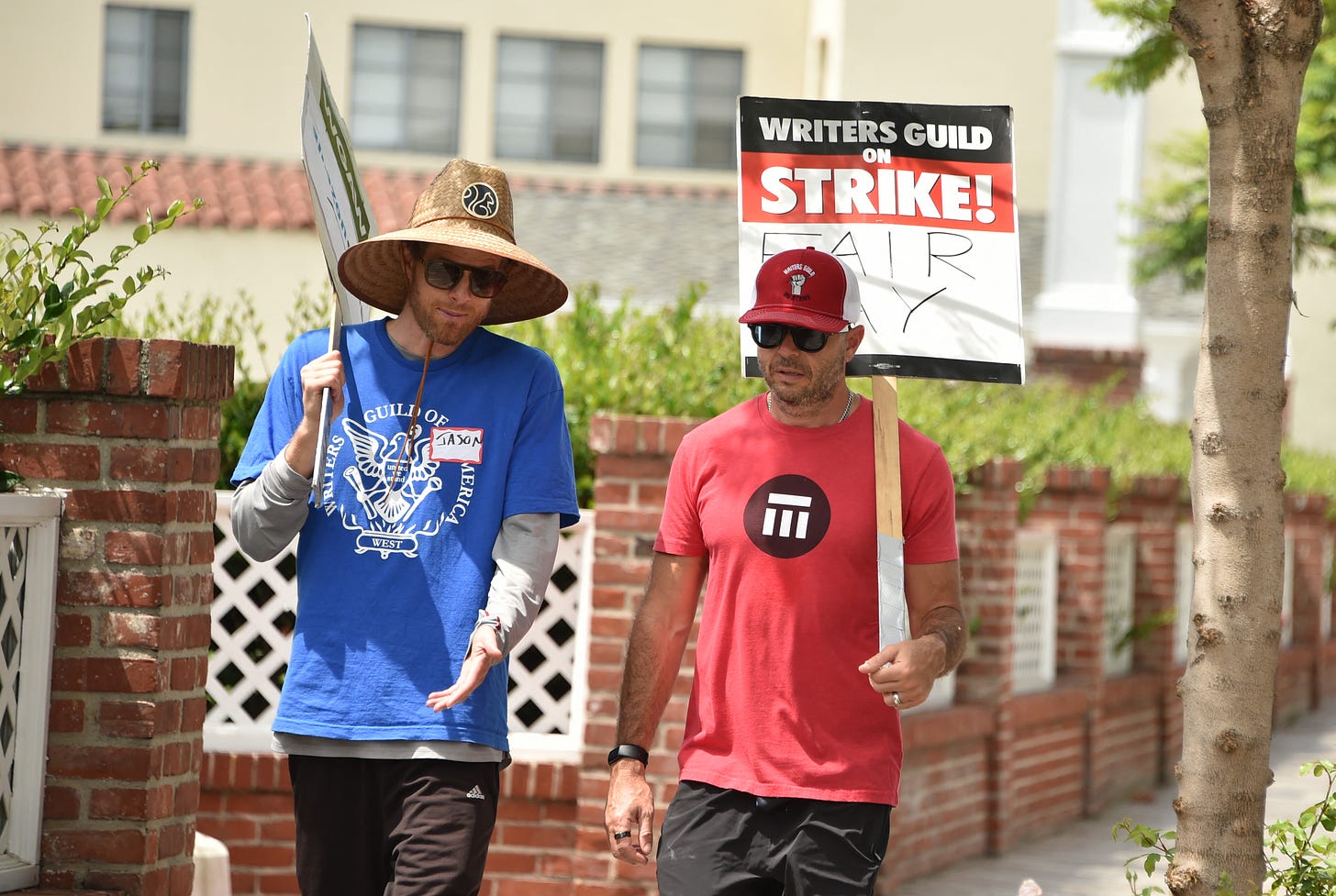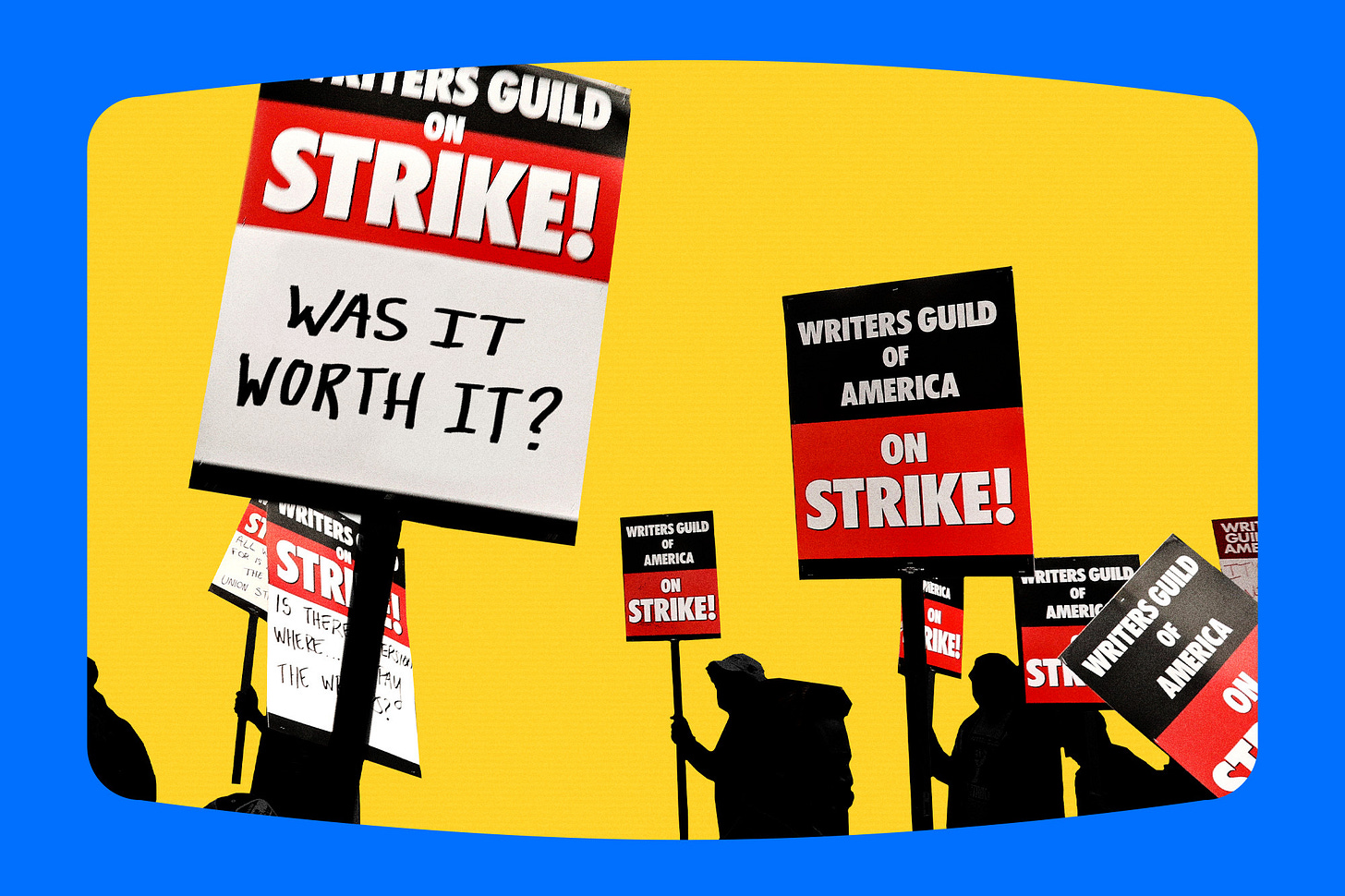Studios vs. WGA: Writers Reveal Rage, Rewards, Reality Two Long Years Later
On the strike-aversary, Shawn Ryan, Damon Lindelof and more tell me how they really feel and the next debates roiling negotiations set to begin in 2026
Lesley Goldberg reports from L.A. She wrote about what it takes to get staffed in a writers room today and why more buyers are losing interest in pricey limited series and turning to ongoing, broadcast-style dramas. Reach her at lesley.goldberg@theankler.com
One year from today, on May 1, 2026, the current three-year Minimum Basic Agreement between the Writers Guild of America and the studios — the one achieved after the months-long 2023 writers’ strike that, together with an actors’ strike, ground Hollywood to a halt — will expire. This next round of negotiations will feature a number of new players, including Greg Hessinger, who replaced 15-year veteran Carol Lombardini atop the Alliance of Motion Picture and Television Producers, which represents the studios. The WGA, meanwhile, will be without former co-chair of the negotiating committee (and the WGA West’s onetime president) Chris Keyser, who stepped aside after the work stoppage — the longest in guild history — ended two years ago.
The WGA has yet to reveal a timeline ahead of the 2026 negotiations and is still sorting out who will comprise its negotiating committee as talks don’t typically start until the months preceding the MBA expiration date. Negotiations in both 2020 and 2023 initiated in March. “We don’t talk to press about negotiations until we’ve had critical conversations with our membership in the months prior to contract expiration,” a WGA West spokesperson tells me.

If it seems early to anticipate the next MBA, tell that to all the writers still struggling to find their feet again after being told to “survive ’til ’25.” Such hot-button issues as AI and streaming residuals that were at the center of 2023’s negotiations continue to frustrate the industry, as my colleague Elaine Low reported on the one-year anniversary of the strike’s conclusion, and several TV writers I surveyed in March don’t feel as if the strike was really worth it after they returned to a contracted post-Peak TV landscape.
Some of the scribes I heard from (Damon Lindelof, Shawn Ryan, Clyde Philips, Franklin Hardy among them) were willing to go on record with their gripes while others requested anonymity as for many, the labor action’s victories (a 12.5 percent wage increase over three years, minimum writers room size protections and streaming bonuses) quickly paled compared to myriad new challenges. The responses to my survey — which also solicited suggestions about how to fix the development process and the insanity of staffing — reveal a town still divided between those who unwaveringly support their union and another group who don’t believe the work stoppage was worth the “good in theory” gains.
“It may be short-sighted to answer the question of if the strike was worth it right now. We’ll have a much better sense in five years,” showrunner Lindelof (Watchmen, The Leftovers) tells me. “I do believe that if unions don’t demonstrate that they’re willing to strike, they have almost no leverage in a negotiation, and the only way to demonstrate that willingness is to actually do it. If this is true — and boy, hope it is — then the gains we make in the next several cycles will be thanks to the strike of ’23.”
In the passionate and often poetic responses to my survey, collected for today’s newsletter, you’ll hear from more top showrunners and writers and learn:
Writers’ views on if the strike — depending whom you ask — caused, accelerated or is helping them ride out the current contraction
What really caused the downturn, and how the WGA can help its members get through it
Why periods of unemployment for TV writers are now “inevitable,” and how the WGA can help members survive them
How new guidelines from the 2023 MBA affect those at the top of the pile: showrunners
Why one showrunner believes the MBA means many rising scribes “will probably not go on to become professional writers”
How the WGA’s efforts to communicate the benefits of the strike gains backfired with some members
Why many guild members stand 100 percent behind the goals and achievements of the strike




